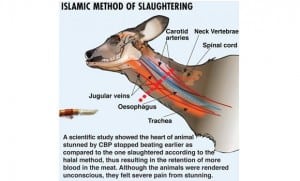In the wake of a controversial Belgian ban on halal and kosher slaughter, the debate surrounding the two religious practices is heating up.
The decision means that the practice is now is now illegal in the northern region of Flanders.
Some are saying that the ban is a violation of their religious freedom and others are arguing that it’s preventing animal cruelty.
So now might be the perfect time to learn what halal and kosher food practices actually entail, if you aren’t already aware.
What makes meat halal or kosher?
 Both halal slaughter and Jewish shechita slaughter involves slitting the throat of healthy, conscious animals, and electronically stunning livestock before they’re killed is in direct violation of this.
Both halal slaughter and Jewish shechita slaughter involves slitting the throat of healthy, conscious animals, and electronically stunning livestock before they’re killed is in direct violation of this.
Now, the only place where people in Belgium will be able to buy kosher or halal meat is in Brussels.
Halal and kosher slaughter is permitted in the UK, with strict guidelines on how to carry out the slaughters legally, including that the slaughters must take place in a Food Standards Agency approved slaughterhouse and that it must be done by a person with a special certificate of competence.
While there are those who argue that this method of killing is cruel, there are others who argue that it’s kinder than the alternative.
Practitioners are advised which arteries to sever so that the animal’s suffering is minimised. The reason why stunning is forbidden is because the ritual requires that the animal is in perfect health, which naturally means that it will have been well-cared for throughout it’s life. When halal or kosher slaughter is done properly, it takes mere seconds for the animal to lose consciousness.
Differences between halal and kosher
There are quite a few things that set halal and kosher meat apart from each other.
For instance, any adult Muslim of sound mind can perform a halal slaughter, however only one kind of Rabbi, a Sachet, can perform a kosher slaughter after special training.
Muslims see the whole animal as halal if it’s been slaughtered in the correct way, however Jewish people who follow kosher view the hind-quarters of cattle and sheep non-kosher no matter how the animals were killed.
What does the Belgian ban on halal and kosher slaughter mean?
Halal and kosher animal slaughter is now illegal in Flanders, a region in the north of Belgium, as of New Years Day.
This new Belgian legislation has ensured that animals will by law now have to be stunned before they’re killed.
The ban has been the source of plenty of controversy and opposition with many animal rights organisations say that kosher and halal practices are cruel.
European Jewish Congress president Moshe Kantor argued that the ban ‘attacks the very core of our culture and religious practice and our status as equal citizens with equal rights in a democratic society.
Moshe Kantor said: ‘We call on legislators to step back from the brink of the greatest assault on Jewish religious rights in Belgium since the Nazi occupation of the country in World War Two.’



